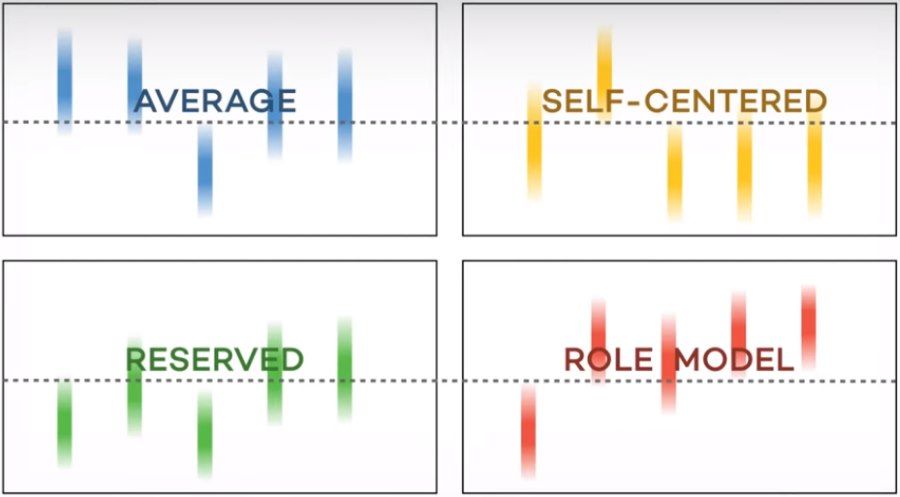
Scientists have identified four new distinctive personality types
After analyzing survey data from more than 1.5 million respondents, psychologists at Northwestern University identified four new personality types that they believe most closely reflect the nature of human beings. According to the new findings, the new personality types are: average, withdrawn, exemplary and egocentric.
The new personality types are based on five ogólnie accepted, basic personality traits by Paul Costa and Robert McCrae. This is currently the most popular theory often referred to as the Big Five and deriveósorts: neuroticism, extraversion, agreeableness, conscientiousness and openness to new experiences.
Researchers’ findingsów from Northwestern University challenge existing paradigms in psychology and could potentially be useful to managersóIn participating in recruitment processes and for psychologistów.
New research conducted by Luísa Amaral appeared in the journal „Nature Human Behavior”.
– People prób They classified personality types from timeóin Hippocrates, but wspóhe modern scientific literature has found this to be nonsense,” said wspóresearch router William Revelle.
Initially, however, Revelle – Psychologist by profession – was skeptical about the premise of the study. The concept of typeóin personality in psychology remains controversial. In this field, it’s hard to find hard evidenceód scientific. Previous próto be based on small research groups create results thatótions that often could not be repeatedóiew. On top of that, psychologists themselves shy away from assigning one particular personality type to someone. However, the paper’s authors say that thanks to their research, this will change.
Northwestern University researchers have combined an alternative computational approach – advanced machine learning algorithm – with data from four surveys conducted with more than 1.5 million respondentsów from all over the world. The scientists obtained the surveys from John Johnson's IPIP-NEO, myPersonality and BBC Big Personality studies. The questionnaires ranged from 44 to 300 questions.
People voluntarily participate in this type of online research. They are attracted by the possibility of receiving feedback on their own personalities. Data acquired in this wayób are made available to research institutions for independent analysis.
– The really cool thing is that a study with such a data set wouldn’t have been possible if not for the Internet. Researchers would probably recruit across campuses and maybe collect a few hundred waspsób. Now we have all the online resources available – Amaral said.
Researchers initially wanted to see if algorithms would group survey results into types corresponding to the Big Five. However, the algorithms indicated clustering in four areas.
The algorithm first searched the data using traditional clustering methods. He then screened them by imposing additional restrictions. This procedure revealed four groups. Pa analysis resultóin the researchers wyróThey have identified four new personality types.
- Average type. The average person has high levels of neuroticism and extraversion, and low levels of openness to new experiences. As is not difficult to see, researchers to describeóIn new types ofóIn personality, they used terms from the Big Five. Scientists say this is the most common personality type, especially in women.
- Type withdrawn. A person with a withdrawn personality is emotionally stable, but is not open to new experiences. These people have low neuroticism. They are compliant and conscientious.
- Exemplary type. It relates to osób, whoóre have a low degree of neuroticism, but all other Big Five traits are at a high level. They are role models worthy of emulation. It often applies to osób older and more women have this personality type. – They are good, responsible people whoóers are reliable and open to new ideas. Life is easier if you have more contactów with the exemplary type – said Amaral.
- The egocentric type. People with this personality type have high levels of extraversion, but openness, agreeableness and conscientiousness are below average. – These are the people with whomórymi do not want to meet – assessed Revelle. The group has the highest number of young individualsób. Males predominate.
Oprócz serving as a tool, które can helpóc mental health institutions to assess personality types with extreme traits, the results of the study can be helpful to the manageróin the recruitment process, whichóers want to ensure that a potential candidate is a good fit. They may also work well for dating services.
Personality type changes with age. The older a person gets, the less neurotic they are and the more conscientious and agreeable they are. – When we look at large groups of people, we can see that there are trends thatóre over time change someóre of these basic characteristics. This could be the subject of future research – said Amaral.





